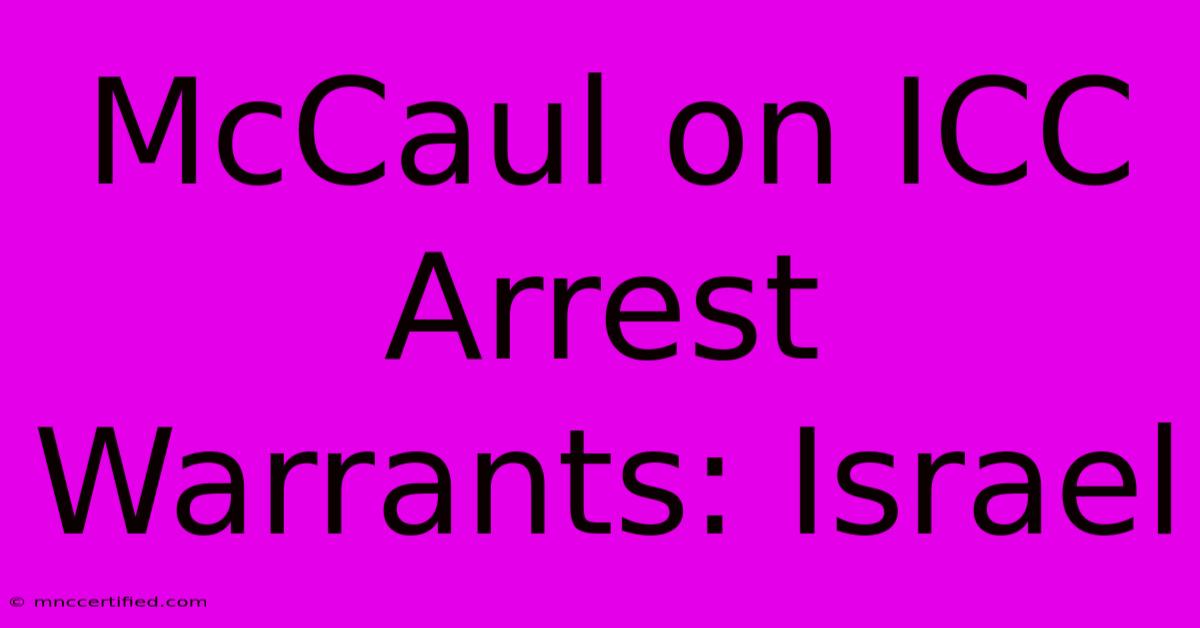McCaul On ICC Arrest Warrants: Israel

Table of Contents
McCaul on ICC Arrest Warrants: A Deep Dive into the Israel Conflict
The recent International Criminal Court (ICC) issuance of arrest warrants for individuals allegedly involved in war crimes related to the Israeli-Palestinian conflict has ignited a firestorm of international debate. Leading the charge in criticism is U.S. Representative Michael McCaul, Chairman of the House Foreign Affairs Committee. This article delves into McCaul's stance, the broader context of the ICC's involvement, and the complex geopolitical implications.
McCaul's Strong Condemnation: A Vocal Critic
Representative McCaul has been a vocal critic of the ICC's actions, consistently arguing that the warrants are unjust and undermine the U.S.-Israel relationship. He views the ICC's investigation as biased and politically motivated, claiming it unfairly targets Israel while ignoring alleged abuses by Palestinian groups. McCaul's arguments frequently highlight:
-
Sovereignty Concerns: He emphasizes the principle of national sovereignty, asserting that the ICC's actions overstep its authority and interfere with Israel's internal affairs. This argument aligns with the longstanding U.S. position of opposing ICC jurisdiction over American citizens or its allies.
-
Bias Allegations: McCaul frequently accuses the ICC of exhibiting anti-Israel bias, pointing to what he sees as a disproportionate focus on Israeli actions compared to alleged violations by Palestinian factions. He calls for a more balanced and impartial investigation, encompassing all parties involved in the conflict.
-
Threats to U.S. Security: Linking the ICC's actions to broader security concerns, McCaul suggests that the warrants could negatively impact U.S. national security interests by jeopardizing its alliances and creating instability in a volatile region.
Specific Statements and Actions
McCaul's pronouncements haven't been limited to statements; he’s taken concrete actions to counter the ICC's move. This includes:
- Legislative Action: He's been instrumental in pushing for legislation aimed at protecting U.S. personnel and allies from ICC prosecution, including sanctions against ICC officials.
- International Diplomacy: He's engaged in diplomatic efforts with allied nations to build a united front against the ICC's decision and to encourage alternative avenues for addressing alleged war crimes.
- Public Commentary: Through frequent media appearances and public statements, McCaul has effectively amplified his criticism of the ICC, shaping the narrative surrounding the issue within the United States and internationally.
The Broader Context: ICC's Jurisdiction and the Israeli-Palestinian Conflict
The ICC's investigation into the Israeli-Palestinian conflict is rooted in the Rome Statute, the treaty establishing the court. However, Israel is not a signatory to the Rome Statute, leading to significant debate about the legality and legitimacy of the ICC's actions. This raises critical questions about:
- Jurisdiction: Does the ICC possess the authority to investigate and prosecute individuals in a non-member state, particularly when the state in question disputes the court's jurisdiction?
- Impartiality: Are the ICC's investigations impartial and unbiased, or are they subject to political influence and pressure?
- Effectiveness: Can the ICC effectively contribute to peace and justice in the Israeli-Palestinian conflict, or is its involvement counterproductive and likely to escalate tensions?
The Geopolitical Implications: A Complex Web
The ICC's decision and McCaul's response have significant geopolitical implications, impacting:
- U.S.-Israel Relations: The strong U.S. support for Israel, combined with McCaul's vocal opposition to the ICC, reinforces the close strategic partnership between the two nations.
- International Law: The controversy highlights ongoing debates regarding the scope and limits of international law and the role of international institutions in addressing complex conflicts.
- Regional Stability: The ICC's actions and subsequent reactions could destabilize an already volatile region, further hindering peace efforts.
Conclusion: Navigating a Contentious Issue
The ICC's issuance of arrest warrants and McCaul's forceful response represent a critical juncture in the Israeli-Palestinian conflict and international law. The debate surrounding jurisdiction, impartiality, and geopolitical implications requires careful consideration. Understanding McCaul's perspective within this broader context is crucial for comprehending the complex dynamics at play and the potential ramifications for the future. Further research and analysis are essential to navigate this contentious issue effectively.

Thank you for visiting our website wich cover about McCaul On ICC Arrest Warrants: Israel. We hope the information provided has been useful to you. Feel free to contact us if you have any questions or need further assistance. See you next time and dont miss to bookmark.
Featured Posts
-
Ken Reid Veteran Journalist Remembered
Nov 22, 2024
-
Reverend Coles Partner A Tragic Loss
Nov 22, 2024
-
Matt Gaetz And Wife Ginger Luckey
Nov 22, 2024
-
Vacant Land Insurance California
Nov 22, 2024
-
Rollo Insurance Huntsville Texas
Nov 22, 2024